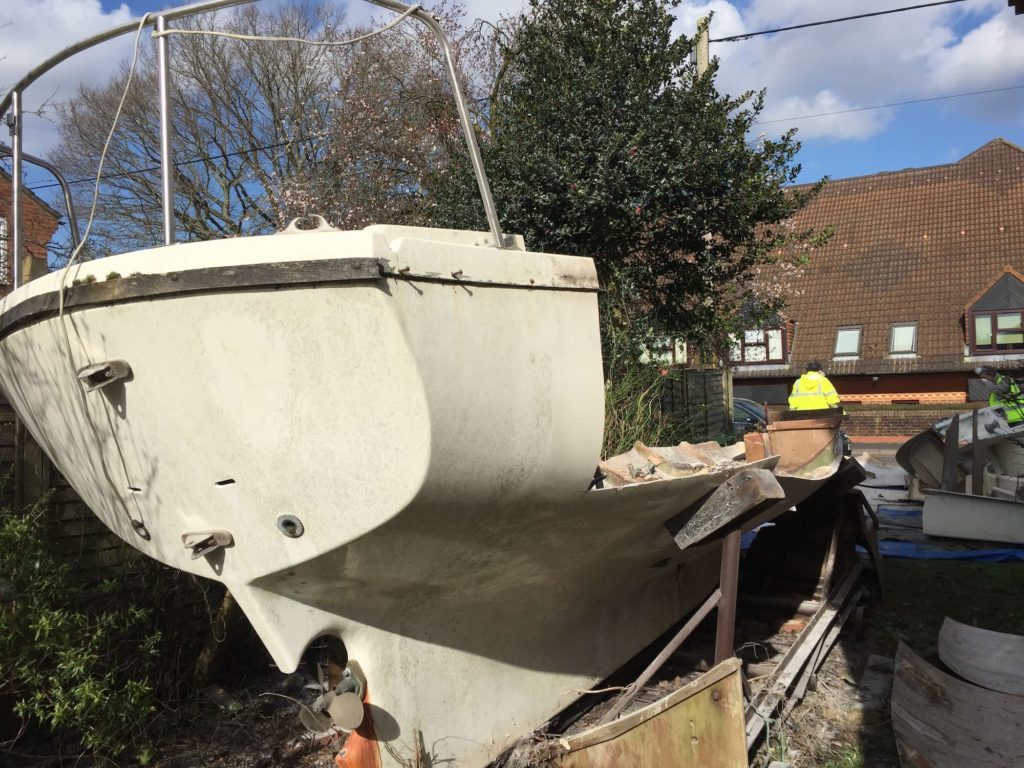Shameful situation of UK’s ‘end of life’ boat policyEnd of life vessels,

It’s time to hold the marine industry to account, warns boat recycling expert Luke Edney, in the first of a short series.
End of use boats are an impending issue, not just for the UK, but for the rest of the world too. Fibre-Reinforced Plastic boats can be found across the globe. But currently there is no plan or procedure for effectively recycling the FRP hull material.
For a long time, it has seemed the marine industry was well aware of the problem but reluctant to give it any thought or planning. However, a recent shift in public opinions on marine plastic waste and recycling has started to change that.
UN report
Recently the problem has now reached the attention of the United Nations. The UN commissioned research company AQASS Ltd to write a report on the issue. Report author, Dr Simon Bray, is a marine ecologist with a background in pollution studies and environmental management.
The report was commissioned as Tahiti was being inundated with boats that people were dumping on the South Pacific island, which they had little infrastructure to deal with. As Dr Bray began to unravel the issues, he quickly realised that this was a problem the whole world was struggling to sort.
Here in the UK, only Boatbreakers, based in Portsmouth Harbour, is dedicated to boat disposal and recycling. We recently met with Simon from AQASS Ltd to discuss his report and we all came to the same conclusion: of all the developed nations, the UK is lagging behind the rest.
The EU often discusses the issues as member states have begun to float ideas for solving parts of the problem. Back in 2012, there was scheme set up called Boat Digest with the aim of creating a network of boat breaking yards across Europe. However, eight years down the line very few still exist – probably as a result of the funding drying up.

Potential solutions from other countries
More recently, France is looking to add a levy on new builds. This money will then be put aside for when the boat comes to the end of its life. This is a good idea for solving the issue of who pays for the disposal process. There is one problem though, if the boat’s sold to another country does the pot of money move to the nation where the boat is eventually scrapped?
Sweden and Holland have boat breaking yards that benefit from government funding to assist with the clean-up and salvage of abandoned boats. Norway has companies that are experimenting with grinding FRP down and using it to make flowerpots, benches and other items.
Germany has banned FRP going to landfill, largely due to the problem of dealing with old wind turbine blades. This knock-on effect means waste FRP from boats can’t be put into landfill. It’s only a matter of time until other nations follow suit, banning it going to landfill without a solution in place.
Canada has a funded scheme that is effectively combing the coastline looking for wrecks and abandoned boats and then disposing of them.
In the US, there is a funded project to break boats down and use the waste FRP material in the cement industry. RIMTA is a company based in Rhode Island who came to our attention in Europe after featuring on the METSTRADE sustainability panel in 2019.
All of the different ideas being worked on in other countries put what’s being done in the UK to shame. We currently rely on the honesty of the last owner of the boat to stump up the cash to scrap the boat. Which, after being stripped, ends up in landfill. As a country and marine industry, we need to learn from our neighbours and start finding greener solutions.
Tomorrow, Luke looks at the costs of waste disposal.










